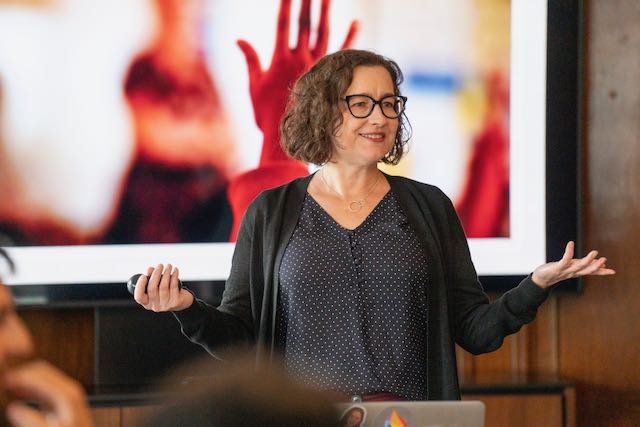How to introduce yourself - or someone else - before a speech. My 3 top tips
Today I’m sharing my top 3 tips for creating your speaker’s intro (aka “your bio.”) If you’re a guest speaker or speaking at a conference, you’ll likely have someone else introducing you.
If you’re speaking on a panel, or you’re presenting but don’t have someone to kick you off - guess what? It’s all on you to introduce yourself.
Just like any other part of your speech, your intro needs to be prepared in order to do well. Preparing your own introduction or opening is important because it sets the tone and will either engage your audience - or let them know this is a waste of time. Read on.
Prepare your intro.
You assume you know about yourself and can just wing it once you take the stage. You are wrong.
If you’re introducing yourself, this is the first impression the audience will have about you. Make it a strong one!
Think about your speech, and then answer:
What is this about? (Topic)
Why am I the person to speak about this? (Experience)
What credentials or evidence do I have to illustrate that I know this stuff? (Degrees, years of experience, authoring material…?)
Once you’ve written this down (and DO write it!), practice it. Out loud, at least 3 times. This will build your confidence, and give you a solid start.
“Your audience is there to hear your thoughts on this topic; not to hear you verbally working through an unprepared speech. They don’t want a long wind-up to your topic.”
2. Tell us 2-3 things (max!) that establish your cred.
We want to hear about what makes you the expert - not everything about you.
I’ve had the displeasure to work with unprepared speakers whose lack of preparation showed the minute they took the stage.
#1 was a former boss of mine who had a habit of passing off Dale Carnegie’s stories as his own. Add to that the time he was hired to present to a global insurance agency: he was given a 60-minute slot, and spent the first 30 talking about himself, his accomplishments, and how great he was.
The client was not pleased.
#2 was a fellow panelist. Our panel was allotted 10 minutes for each speaker. We were to introduce ourselves, speak on our topic for a few minutes, then pass the floor to the next panelist.
The person who opened our panel began with, “When Melissa first asked me to speak about [topic]…” He went on for 10 minutes about every step he took to research our topic, including looking up terms he didn’t understand. The rest of his presentation was just as rambling as his 10-minute opener, and it cut into the time of the other panelists.
This affected the audience negatively; we did not have time for their questions.
Your audience is there to hear your thoughts on this topic; not to hear you verbally working through an unprepared speech. They don’t want a long wind-up to your topic.
Better would have been for either speaker to say why they are qualified to speak on this topic.
When I open my trainings or speeches, I let people know:
I’m a professor in the School of Communication at Loyola University.
I’ve helped multiple senior managers get promoted.
I think public speaking is fun, and should be easy.
See? 3 things! Establish your cred by telling us what you know or do (or both.)
Prep your intro. Rehearse it. And when you deliver it…
3. Keep it short.
This is an introduction, not your résumé. See numbers 1 and 2 above.
Short, sweet, and to the point is the way to go. In addition to the tips above, think about the time you’re given. If you have 20 minutes, 5 of those minutes should not be you introducing yourself. That’s 25% of your time!
Some networking groups have a 1-minute introduction at the start. If you begin with, “Good morning, I’m happy to see everyone, glad to be here…” you’ve just used up 3 of your 60 seconds. Better to jump right in with the important stuff about you: “Hi, I’m Randy Ford with First Story Strategies…”
And: Shorter = Memorable.
See my talk with Randy Ford below for more tips on writing your bio. We discuss when you should have a shorter bio (in-person) and when it’s okay to add a little more.
ps - A personal pet peeve Randy and I share: Speakers who overthank, or work lengthy thank-yous into the intro. This is a time suck, and not interesting to your audience!
What to read or hear next:
Is it okay to drink before I give a toast? 2-minute Voice Memos
For Women Only: Three Speaking Tips
About The Author
Hi! I’m Marianna. I can help you rock your introduction.
I make public speaking easier for my clients. In addition to Presentation Skills workshops, I offer executive coaching and Keynote speeches. I work with leaders and their teams through executive coaching, workshops, and hybrid workshops and coaching.
To learn more, schedule a call with me.





